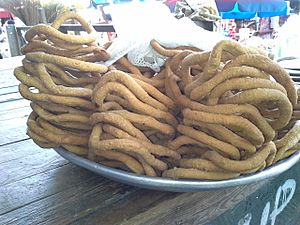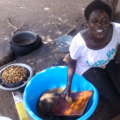Kuli-kuli facts for kids

Kuli-kuli of Ghana
|
|
| Type | Snack |
|---|---|
| Place of origin | Nigeria, Ghana |
| Region or state | North Central Nigeria |
| Created by | Nupe, etincity |
| Invented | 1920 |
| Serving temperature | Room temperature |
| Main ingredients | Peanuts |
| Ingredients generally used | Oil, salt, sometimes black pepper, spices |
Kuli-kuli is a yummy and crunchy West African snack. It is mostly made from peanuts. The Nupe people of West Africa first created this tasty treat.
Today, Kuli-kuli is a very popular snack. You can find it in countries like Nigeria, Benin, northern Cameroon, and Ghana. People often eat it by itself. Sometimes, they mix it with garri (also called cassava flakes), sugar, and water. This mix is known as "garri soakings." Kuli-kuli also goes well with drinks like Hausa koko, fura, and kamu. You can even grind it up and add it to salads! It is also used as an ingredient for popular dishes like Suya and Kilishi.
Kuli-kuli is made from the leftover parts of peanuts after peanut oil is taken out.
Kuli-kuli in Ghana
In Ghana, Kuli-kuli is a common crispy snack, just like in many other parts of West Africa. However, the ingredients and shapes can be different across the country.
In northern Ghana, especially among the Mole-Dagomba people, Kuli-kuli is made from the leftover peanut bits after groundnut oil is pressed out. You will often find it in areas called Zongo communities in Ghana.
How Kuli-kuli is Made
Making Kuli-kuli starts with roasting peanuts. Then, these roasted peanuts are ground into a smooth paste. This paste is called "Labu."
Next, the Labu paste is mixed with spices and salt. Sometimes, people add ground pepper or a little sugar. To make the Kuli-kuli firm, extra oil is squeezed out of the paste using water. Then, the paste is shaped into different forms, like round balls or cylinders.
Adding a special ingredient called potash to the cooking oil helps it get hotter. This makes sure more oil comes out of the Kuli-kuli as it cooks. While the shaped peanut paste is heated and fried, it becomes solid and hard. After it's cooked, it's taken out of the oil and left to cool down. Once cool, it's ready to eat! Kuli-kuli can last a long time. It is often given to children as a special treat. You might also see teenage girls selling it to hungry travelers at taxi parks.
Women often lead the process of making and selling Kuli-kuli. They might grow the peanuts, take out the oil, cook the Kuli-kuli, and then sell it at the market. This work helps women earn their own money.
Gallery
 | Leon Lynch |
 | Milton P. Webster |
 | Ferdinand Smith |




